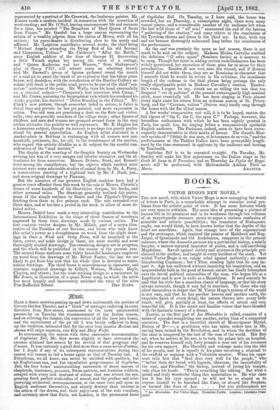Moir.
Thee a dozen sentries passing rip and down underneath the portico of Covent Garden Theatre, and a " block" of carriages radiating in every direction from Bow-street, announced to the most uninterested passers-by on Tuesday the commencement of the Italian season, and on entering the theatre, the conversion of all the tiers into boxes, and the curtailment of the pit till it was barely sufficient to keep up the tradition, intimated that for the next four months Zerlina and .eltnina will reign supreme, vice Eily and Mary Wolfe. In commencing the season with three successive representations of Guglielmo Tell, Mr. Gye seems slightly to have overrated the success attained last season by his revival of that gorgeous chef eceuvre. It was certainly a great deal more than a mere same: d'estime, but I doubt if any of its subsequent representations during this season will ensure as full a house again as that of Tuesday last. A Frenchman, we all know, can never be satisfied with spectacle, but an Englishman can, and the superlative gorgeousness of Guglielmo Tell, the four hours' unintermitting succession of dense masses of shepherds, huntsmen, peasants, Swiss patriots, and Austrian soldiers, arrayed with every rich 'contrast of colour that can attract the eye, pouring forth perfect avalanches of sound, and the profuse and over- powering orchestral accompaniments, at the same time pall upon an English audience themselves, and utterly destroy their interest in the action of the drama, and their enjoyment of the solo vocalism, and certainly show that Paris, not London, is the permanent home of Guglielmo Tell. On Tuesday, as I have said, the house was crowded, but on Thursday, a subscription night, there were many vacant places, and a considerable number of the audience left when
the last wild shout of " armi " announced the end of the famous " gathering of the cantons," and many others at the conclusion of the Tyrolean chorus and dance in the third act. In fact, both eye and ear become thoroughly exhausted long before the conclusion of the performance.
As the cast was precisely the same as last. season, there is not much to be said on the subject. Madame Miolan Carvalho warbled the delicious " 0 selva opaca" (Sombres forties) as it deserves to be sung. Though her taste in adding certain embellishments has been widely questioned, her execution of them goes far to atone for their introduction. Besides Si non vest sono ben travail, and if Rossini himself did not write them, they are so Rossinian in character that I scarcely think he would be severe in his criticism, the inordinate length of the cadenza in the final phrase being perhaps the only really objectionable point in Madame Carvalho's -version. Tamber- Ilk's voice, I regret to say, struck me as telling the tale that too frequent " tits de poitrine" at the present extravagantly high musical pitch, must eventually tell. He has been singing in Paris almost every night since his return from an arduous season at St. Peters- burg, and the " Corriam, voliam " (Suivez moi) hardly rang through the house with the fire of last season.
A few weeks' comparative rest will, it is to be hoped, restore the fall vigour of "the C, the C, the open C." Perhaps, however, the boundless enthusiasm with which he has been nightly greeted in Paris, has spoilt him for singing before a comparatively apathetic English audience. The Parisians, indeed, seem to have been extra- vag,antly demonstrative in their marks of favour. The Gazette Musi- cale speaks of "1'6clair de son nom, et le tonnerre de sa voix," and the performances at the Theatre Italien have been perceptibly length- ened by the time consumed in applause by the audience and bowing by Tamberlik.
Guglielmo Tell is to be repeated • to-night. On Tuesday, Mr. Santley will make his first appearance on 'the Italian stage as the Conte di _Luna in 17 Trovatore, and on Thursday La Fiylia del Reggi- men& will be performed, with Mademoiselle Adelina Patti as






























 Previous page
Previous page